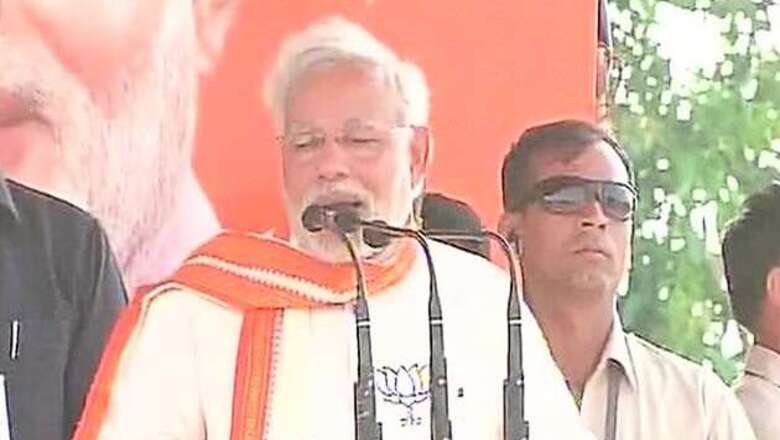
views
When prime ministerial hopeful Narendra Modi asked at an election rally if anyone knew of a country that exported wheat but imported bread, steel makers joined his followers to cheer.
For steel executives, it was just what they wanted to hear: their calls to restrict exports of iron ore further will be met if Modi's Bharatiya Janata Party (BJP) wins the election.
While the move would mean a captive supply of iron ore for steelmakers, it would further dim the prospect of Indian iron ore returning in a big way to the world market. A steep drop in Indian shipments in the past two years has given Australia and Brazilian miners a bigger share of top market China.
"The government in Delhi is such that it exports iron ore but imports steel," Modi said at the rally in the steel city of Jamshedpur last month. "If you run your business like this, how will the country's steel industry survive?"
One of Modi's main election planks is to crank up manufacturing to create millions of jobs by focusing on exporting steel, not iron ore; textiles not cotton. Results of the five-week election are due on May 16.
The gainers of any move to discourage iron ore exports would be steel makers that do not have captive mines and buy ores, such as Kalyani Steels, JSW Steel and Kirloskar Ferrous Industries, as well as international miners such as Rio Tinto and BHP Billiton.
Iron ore exporters such as Sesa Sterlite, Essel Mining, a unit of conglomerate Aditya Birla Group, could lose out. Mining bans in Goa and Karnataka have already taken a toll on Sesa, which operates in both states.
The BJP will also consider incentives for steelmakers as part of its push to promote value-addition, said Narendra Taneja, part of the party's central economic group.
Steel imports have seen double-digit percentage growth in recent years, mainly from countries such as Japan, South Korea and China, despite a target to raise steel capacity to 142 million tonnes by 2017 and 300 million by 2025, from about 90 million currently.
Imports rose 15 percent to a record 7.87 million tonnes, worth $6 billion, in the year ended March 2013, government data shows, as mills ran below capacity due to shortages of iron ore.
The deficit has been created by a court clampdown on illegal mining, before which India was the third-largest exporter with shipments at a high of about 117 million tonnes in 2009-2010.
It has now slipped to tenth, with exports estimated at less than 20 million tonnes last fiscal year but expected to go up as some bans have been lifted.
India has levied a 30 percent tax on exports of iron ore fines and lumps since December 2011, and in January imposed a 5 percent duty on overseas sales of iron ore pellets.
But steelmakers say more steps are needed to keep iron ore prices in check and help raise the competitiveness of Indian steel so that they can export more or at least resist imports.
Taneja said that, if elected, the BJP "will go for a policy shift in the direction of value-added products when it comes to iron ore or other natural resources", but added that it was too early to talk about export duty structures.
"Only exports of value-added products should be allowed and by value addition at least it should go up to manufacturing of (semi-finished metals) blooms or billets," said RK Goyal, managing director of Kalyani Steels. "The moment there is more clarity on iron ore, even we will expand."
But Aniruddha Joshi, a vice president at Sesa, India's top private miner, said that given the country's vast iron ore reserves and its potential to increase further, the best path would be to push for more exploration instead of stifling exports of the commodity. Sesa is controlled by billionaire Anil Agarwal's Vedanta Resources.
As Firoz, chief economist with a division of the steel ministry, said the government was aware of the need to conserve iron ore and cited export duties and higher railway freight costs as steps taken to discourage exports.
He said, however, a blanket ban on iron ore exports was difficult as many traders and companies survived solely on the proceed, a view echoed by some traders who said the country needed the foreign exchange to pay for huge oil imports.
Steel capacity addition has also been delayed by difficulties in obtaining land and environmental clearances, as highlighted by South Korean company POSCO's nine-year wait to build a $12 billion plant in Odisha.
The BJP has promised time-bound environmental clearances and better land acquisition policies to promote manufacturing.
"We don't just want to be a commodities or natural resources exporting country," BJP's Taneja said. "We want to become a manufacturing giant of the world."




















Comments
0 comment